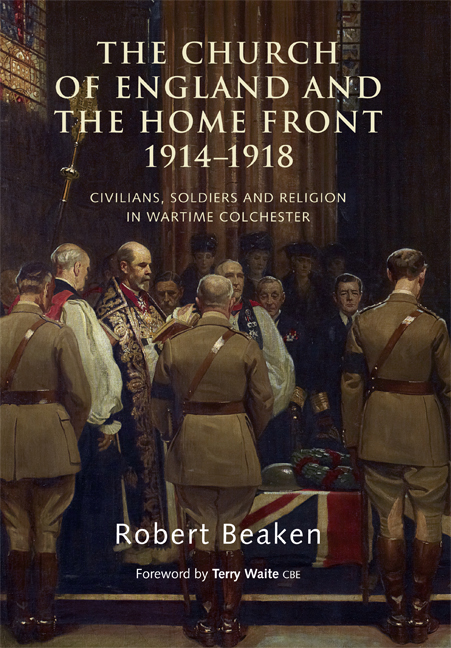 The Church of England and the Home Front, 1914-1918
The Church of England and the Home Front, 1914-1918 Book contents
- Frontmatter
- Dedication
- Contents
- List of Illustrations
- Foreword
- Author’s Acknowledgements
- 1 The First World War – One Hundred Years On
- 2 Colchester
- 3 Wartime
- 4 The Clergy
- 5 The Laity
- 6 Prayer and Worship
- 7 The National Mission of Repentance and Hope
- 8 Thought and Attitudes
- 9 Armistice, Remembrance and Aftermath
- 10 The Church of England and the First World War
- Bibliography
- Index
2 - Colchester
Published online by Cambridge University Press: 11 May 2021
- Frontmatter
- Dedication
- Contents
- List of Illustrations
- Foreword
- Author’s Acknowledgements
- 1 The First World War – One Hundred Years On
- 2 Colchester
- 3 Wartime
- 4 The Clergy
- 5 The Laity
- 6 Prayer and Worship
- 7 The National Mission of Repentance and Hope
- 8 Thought and Attitudes
- 9 Armistice, Remembrance and Aftermath
- 10 The Church of England and the First World War
- Bibliography
- Index
Summary
Colchester is situated on the river Colne in Essex, fifty-two miles north-east of London and six miles south of Suffolk, and claims to be Britain's oldest recorded town. By the time of the Roman invasion of England in AD 43, Colchester was an important centre for trade between East Anglia and the continent, and under Roman rule it grew and flourished as a colonia or major colony and the first capital of Roman Britain. The Romans developed the port at Sheepen, and good communications ensured that Colchester became an important strategic and economic centre. Colchester remains very conscious of its Roman past: the town is still encircled by the walls constructed by the Roman military engineers, the broad High Street follows the outline of the old Roman arena, and the castle is built on the ruins of the temple of Claudius, later destroyed by Queen Boadicea.
By 1914, the population of Colchester was 43,452. Some of the townsfolk still lived within the Roman walls, but during the nineteenth century the town had expanded beyond them. Upper middle-class housing for the town's professional families had been built along the Lexden Road to the west. Much of Colchester's working-class population lived to the east at the Hythe, in overcrowded and poor conditions – some little better than slums – near to the factories and workshops that had developed in that quarter because of its proximity to the docks and the railway. To the south-east, lower middle-class terraced houses and villas had been built at New Town, whilst to the south-west sprawled the barracks. North of the Roman walls, ‘respectable’ working-class housing had been developed near to the North Railway Station in the St Paul's district. The town had two other railway stations: St Botolph's Station at the bottom of the Mersea Road, and the Hythe Station by the river.
In 1914, Colchester remained an important agricultural centre for north Essex and south Suffolk, with regular markets and auctions of livestock. Flour milling and brewing were important local industries. During the last quarter of the nineteenth century, however, the town experienced a belated, but nevertheless important, industrialisation.
- Type
- Chapter
- Information
- The Church of England and the Home Front, 1914-1918Civilians, Soldiers and Religion in Wartime Colchester, pp. 4 - 29Publisher: Boydell & BrewerPrint publication year: 2015


